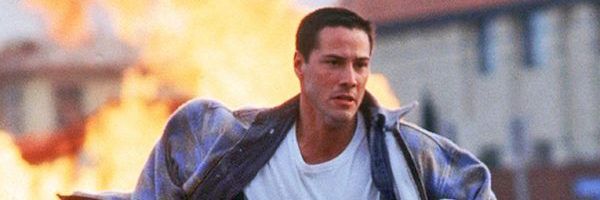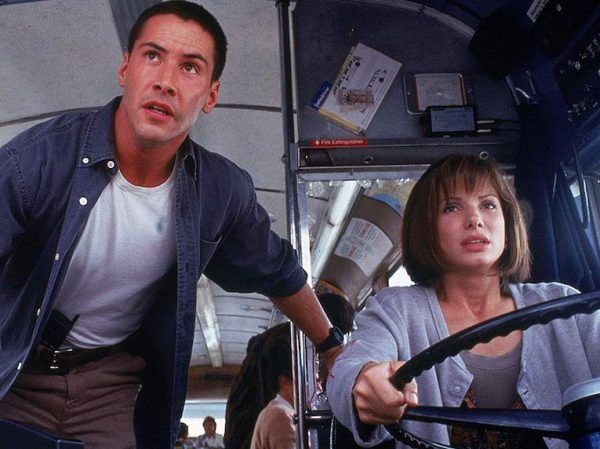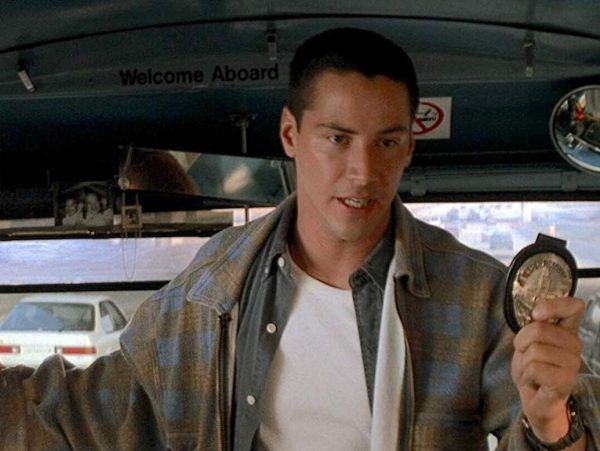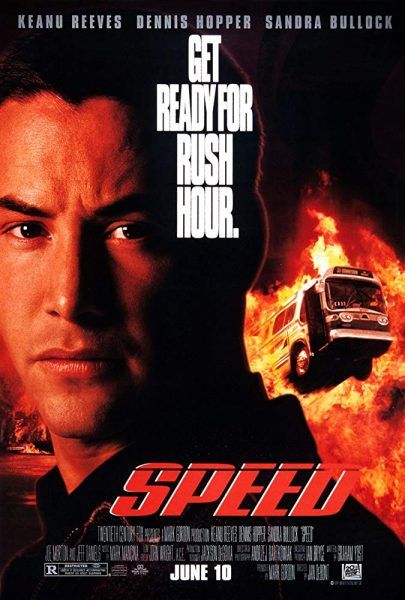As I sit down to write this it is currently 6/9, a date that would make Ted Theodore Logan most overjoyed and an overall shout-out to Keanu Reeves, the current king of the pop culture landscape. Yes, friends, we are in the midst of a full-on Keanu-ssance—a Belle Reeve-poque, if you will—that kicked off the moment the actor emerged be-suited to murder Theon Greyjoy for killing his dog in John Wick and has run straight through two more Wick sequels, a mighty thirst-inspiring turn in Netflix's Always Be My Maybe, a standout stuntman role in Toy Story 4, and this recent video where he says "cyberpunk" in a Batman voice. I do not know the context of that video. It doesn't matter. What does matter is that this recent resurgence is the perfect opportunity to remember that not only does Keanu still have it, he never really quite lost it, quietly building one of the sturdier resumes out there over the course of several decades. Look back, remember that Bill & Ted's Excellent Adventure set the bar for heart-warming stories of bro-love; remember that The Matrix basically changed action filmmaking forever; remember—and this is important for today's discussion—that the 1994 flick Speed still owns to this day.
It does. It simply does. It did in 1994 when it snagged $350 million on a $38 million budget (plus a perfect 4/4 Roger Ebert review), and it does today, exactly 25 years since it premiered, with all that time and all those rip-offs in-between doing nothing to dilute the fact that director Jan de Bont's bus-bomb movie still owns so hard it should be illegal in some form. The premise, for the unfamiliar: Having been thwarted once by LAPD Officers Jack Traven (an extremely short-haired Reeves) and Harry Temple (an extremely oddly-cast Jeff Daniels), former bomb squad officer turned terrorist Howard Payne (Dennis Hopper) straps a bomb to the bottom of an L.A. bus that will detonate should the vehicle drop below 50 miles-per-hour. Traven hops aboard the bus exactly like you'd expect a person named Jack Traven to do, spunky local Annie Porter (Sandra Bullock) takes the wheel, and the movie is off to the races.
It's an absurdly simple premise that is then constructed outward into a two-hour explosion factory that defies both physics and God at every turn, which is of course exactly why the film works so well. One of the only modern-day movie things that turn me into a get-off-my-lawn old person is that I believe action movie premises need to be simpler and dumber again, with "dumber" of course being a high compliment. There's a reason that pretty much every other action film after 1988—yes, even Speed!—was labeled a Die Hard rip-off. Die Hard understood quite possibly more than any other action film in history how to do a lot with something deceptively simple. It's the difference these days between, say, a Fast & the Furious entry and Mad Max: Fury Road. The F&F films seem like a lot because they are A Lot, and by movie's end, you're mostly numb to the crashes. Fury Road seems like a lot but it's essentially just an hour-and-a-half car chase; because an insane Australian director took that premise and then blew a bunch of dope-looking go-karts to all fuck out in the desert, it turned into a masterpiece.
So, Speed, which underneath the there's-a-bomb-on-the-bus! type plot is really just the story of an average guy trying his darndest to get everyone out of this L.A. afternoon-gone-wrong in one piece. That's actually pretty much how Joss Whedon, who did substantial uncredited work on the script, described Reeves' character: "What if he’s just the polite guy trying not to get anybody killed?” Sure, anyone with a basic working knowledge of Los Angeles traffic knows that bomb is going off within 15 minutes, tops. And sure, a bus straight-up flying off an unfinished overpass and clearing the gap is such a leap in scientific logic that I'm pretty sure Neil DeGrasse Tyson gets a nosebleed whenever this movie replays on Starz. But these are the types of action beats that can be glossed over when there's a simple core of relatability at the center of the madness.
Funny enough, a lot of that doesn't even come from Reeves here. Speed came three years after jock-brah action hero Johnny Utah in Point Break and five years before goober-messiah Neo in The Matrix. Reeves is slotted into much more of a blank-slate here, and while it's not a misfire casting on the level of like, Bram Stoker's Dracula (also 1994!), it is essentially a straight-man role more than anything. Really, it's Bullock that grounds the film; she exudes a type of real-world nervousness mingled with confidence from the moment she shows up. Because Annie is on the bus, we're on the bus.
And whatever the exact diametric opposite of "grounded" is, that's what Dennis Hopper is here to do. Dennis Hopper in Speed is, not even kidding, the best Joker ever put to film. The Oscar-nominee is straight vaudevillian in his over-the-topness; I'm relatively sure he was paid for this film with a hefty daily allowance of cocaine and nothing else. But, again, it works, because if you're sticking everyday people into a sick, unimaginable puppet show, the person pulling the strings needs to be otherworldly on their own.
Maybe it's impossible to pinpoint the exact special juju makes Speed hold up so well. Maybe it's the fact that it shouldn't hold up so well, much less have worked in the first place. It reminds me of my favorite behind-the-scenes story from the film, told by de Bont on a DVD director's commentary. While filming the bus jump, everyone involved pretty understandably thought there was no way a few tons of rubber and metal would fly further than 20 feet. The bus proceeded to soar way, way further than 20 feet, far longer than anyone could've imagined, and promptly smashed one of the cameras set up to capture the stunt. 25 years later, still unexpectedly smashing.




